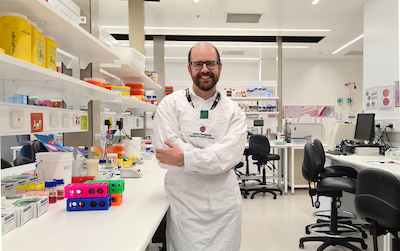Dr Julian Grabek: Identifying subclones in early phase MPN that drive progression and leukaemic transformation

Myeloproliferative neoplasms (MPN) are clonal haematological disorders of stem cells. These stem cells undergo a mutation that drives an overproduction of blood cells. MPNs include
- polycythemia vera (too many red blood cells),
- essential thrombocythemia (too many platelets) and
- primary myelofibrosis (bone marrow transformation into fibrotic tissue leading to bone marrow failure).
Throughout the course of the disease the stem cells are driven by specific mutations (JAK2, CALR and MPL) but over time additional genetic mutations are acquired leading to progression of the disease to either secondary myelofibrosis and bone marrow failure or acute myeloid leukaemia. These outcomes have limited treatment options and have a poor prognosis.
High risk stem cells with the potential to develop into leukaemia can be identified early in the disease but are often a “needle in a haystack” when compared to the rest of the MPN stem cells. By using cutting edge single cell technology Dr Grabek will separate each individual cell of the MPN stem cells. Through a combination of mutational analysis by novel nanopore technology and assessment of downstream gene signalling he will be able to determine the early stages of leukaemia development in these disorders. In future, he hopes to establish which treatments have the potential to arrest these early changes and prevent transformation to leukaemia.
About Julian
Born in Tasmania, Julian completed his medical degree at the University of Tasmania where he developed his interest in haematology and went on to complete his haematology specialist training in Melbourne, Victoria. During this time, he developed an interest in myeloproliferative neoplasms (MPN), particularly the factors that influence progression to leukaemia.
In 2020, Julian moved to Brisbane to take on the opportunity of commencing his PhD with Assoc/Prof Steven Lane. Despite an ongoing global pandemic, this has not slowed his research progress with 2020 already proving a fruitful year with him achieving three first author publications.
This PhD scholarship is kindly supported by The Bourne Foundation.
PhD scholarships are co-funded by the Leukaemia Foundation and the Haematology Society of Australia and New Zealand (HSANZ).
Last updated on January 30th, 2023
Developed by the Leukaemia Foundation in consultation with people living with a blood cancer, Leukaemia Foundation support staff, haematology nursing staff and/or Australian clinical haematologists. This content is provided for information purposes only and we urge you to always seek advice from a registered health care professional for diagnosis, treatment and answers to your medical questions, including the suitability of a particular therapy, service, product or treatment in your circumstances. The Leukaemia Foundation shall not bear any liability for any person relying on the materials contained on this website.